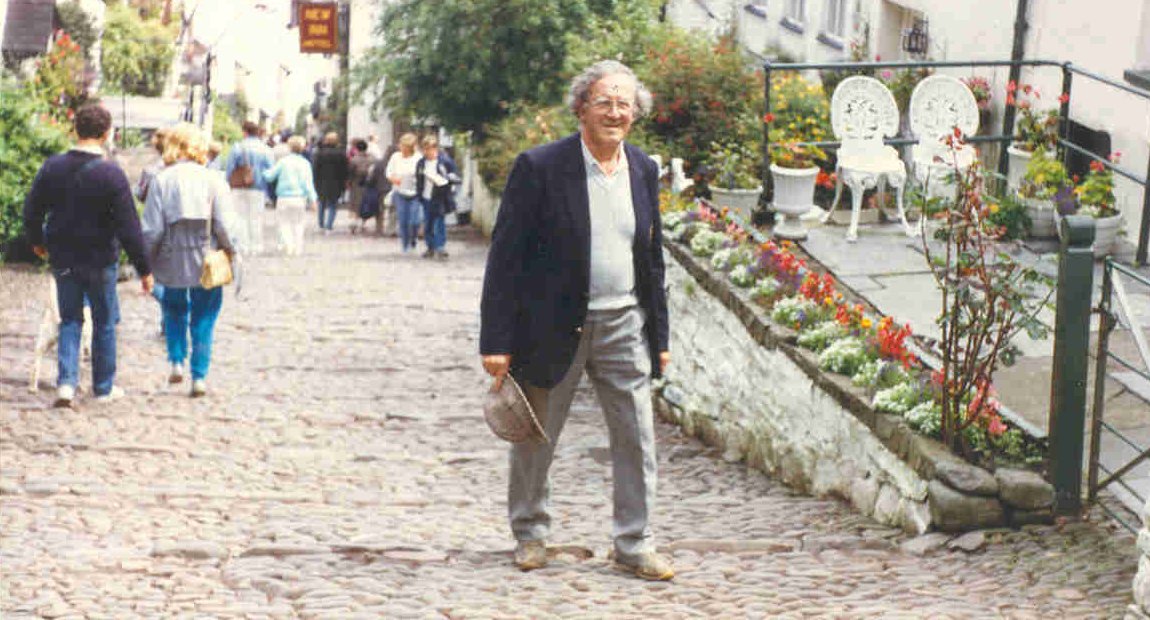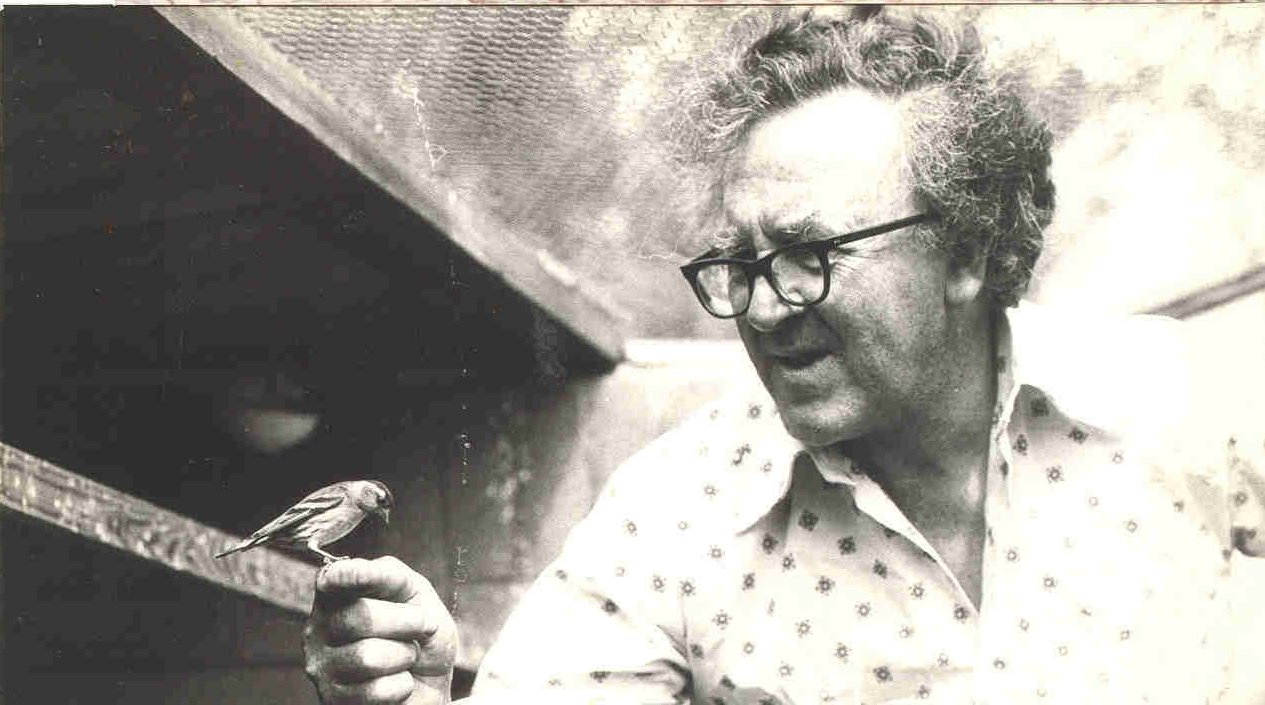Ronald Malcolm
FINCH (1920-1992)
A
biographical outline by Averil Davies

[Ronald
Finch in Clovelly]
Ronald Finch was
born in March 1920 in Hornsey, London, the son of a railway
clerk William Finch who also played as an organist in a local
parish church. Indeed music seems to have been a strong background
in the family as his grandfather John Finch is recorded as being
a musical instrument maker.
Ronald excelled
in music from his schooldays at Slough Secondary School, gaining
a scholarship to the Guildhall School of Music and Drama where
he studied composition with Alan Bush and Gerald Finzi. Like
many of his contemporaries in the arts at that time, he did
not go into active service but he did manage to find some labouring
work in Essex, and later joined a group of like-minded friends
in the downs near Newbury, Berkshire. In the years 1945, 1946
and 1947 Ronald was awarded scholarship and licenciateship prizes
for Composition from the Guildhall School and upon graduating
he was becoming recognized already as an accomplished composer
and pianist. His instrument of choice when he played in ensembles
with fellow musicians was the oboe/cor anglais. The oboe in
fact features in much of his work and he played oboe for pleasure
for many years in the Bedfordshire Symphony Orchestra.
Ronald had an intensely
felt passion for music and the seeds of many of his works were
nurtured in his Guildhall days. He was also an accomplished
linguist with a natural flair for the understanding of the roots
of words and languages. He spoke Russian, Danish, Spanish and
French, and had a deep interest in early English poetry. It
is also interesting to listen carefully to some of his music
and hear influences of his other love, Russian Folk Song. This
love of languages naturally led Ronald to travel and this he
often did to gain inspiration but also to indulge his favourite
hobby, ornithology. He visited Russia, Denmark, France and Spain,
also he enjoyed Malta which is well known to bird lovers as
a place rich in various species which halt on their long migratory
journeys.
During the next
few years after graduating Ronald married and he was gaining
a reputation in the musical circles of the time with his own
compositions which were well received in performances by various
ensembles and orchestras. His wife Jean had a fine soprano voice
and would sing many of the songs Ronald composed. They also
enjoyed visiting musical events, such as the Three Choirs Festival
at Gloucester, where they were enthralled to meet the great
Vaughan Williams. At a Christmas concert held at Laverstoke
Mills in November, 1951, the programme included Ronald’s song
“Love’s Secret” sung by tenor David Galliver and accompanied
by the Newbury String Players, conducted by Gerald Finzi.
At Chelsea Town
Hall, April 1952, The Haydn Orchestra, led by Leonard Friedman,
conducted by Harry Newstone, gave the first performance of Ronald
Finch’s “Fugue For String Orchestra”.
The programme notes
for this performance written by Harold Truscott, give a good
indication of the developing direction of Ronald’s work:-
“Ronald Finch studied
composition at the Guildhall School of Music with Alan Bush
and Gerald Finzi. He is a slow and extremely self-critical writer
and although he has a respectable list of compositions to his
credit a good half of these he regards as merely formative and
of no other value. Among recent works are the Four Tenor songs
with strings, a Fantasia for String Orchestra, a “Festival”
Overture for full orchestra and lastly, the present work, which
was completed in February of this year. He has chosen what is
obviously, today, the most difficult path in the formation of
an apparently natural style.(No style ever is “natural” in its
beginnings-it has to be found gradually from the work of one’s
predecessors and the imperceptibly growing consciousness of
one’s own personality.)
“This is to steer
one’s boat between the rocks of archaism and the shoals of an
out-of-date extreme modernism. Ronald Finch has achieved this
feat with convincing success in both the Overture and the Fugue
for Strings, and his language now needs only the application
to wider and still deeper thought.
“His Fugue is a
beautiful piece of string texture with a subject of an original
cast. Rhythmically, it is a 4/2 or an 8/4 arranged in two groups
of three plus a two; this offers many opportunities for profitable
development, and these the composer has seized with both hands.
An interesting clue to the spirit of the Fugue is indicated
in the tempo heading- Allegro Ritmico (alla Rhumba).”
Ronald Finch’s works
continued to be performed and he had several works aired on
the Radio throughout the 1970s and 1980s, for example a Northern
University Concert from Lancaster on 9 May 1974 featuring the
Delmé String Quartet with Derek Wickens (oboe), the “Quintet
for Oboe and Strings”.
In 1989, after Ronald
had unfortunately suffered a mild stroke, one of his oldest
friends in the music publishing business, Hans Newman, would
sum up Ronald’s career thus:
“I have known Ronald
Finch for nearly forty years. He is a composer I admire greatly.
His orchestral suites, chamber music and song cycles speak with
an individuality which is traditional and yet timeless. His
pieces have been broadcast on many occasions.
“It is however as
a music copyist and calligrapher that he has worked with me
since the early 1950s. At that time I was in charge of music
production at Boosey and Hawkes. Ronald copied the orchestral
full scores, vocal scores and instrumental parts of difficult
contemporary works, and his beautiful calligraphy, his profound
musical knowledge, his reliability with regard to the usual
deadlines, and his kindness and advice to less able colleagues
soon became well-known among music publishers and copyists alike.
Most of Ronald’s working life was spent in the preparation of
scores for Oxford University Press, such as Walton and Vaughan
Williams. He spent many hours at the home of Gerald Finzi working
on the major work “Intimations of Immortality”. He also prepared
the material for several courses for the Open University.
“Ronald also had
a long working relationship with Schott’s where for instance
his score of Michael Tippett’s “Double Concerto” was greatly
admired. For Faber Music Ronald prepared the score of Benjamin
Britten’s “Curlew River”, another great calligraphic achievement.
Ronald also worked for Novellos, helping them in the preparation
of some of their educational music.
“Finally, I want
to mention Ronald’s work for me. For the last thirty years I
have handled some of the production requirements of G. Schirmer
(New York), Peters Edition (Frankfurt), Barenreiter (Kassel),
and Schott’s (Mainz). Throughout this period I employed Ronald
as a copyist of extremely complex modern works. I cannot speak
too highly of his devotion to his craft, of his professionalism
and reliability in the world of music publishing, where these
qualities are not always to be found.”

[Ronald
Finch with pet siskin]
In his later years
Ronald Finch lived near the Fenlands, near Peterborough in Cambridgeshire.
Two of his later works in particular show a poetic and maturing
style, encapsulating his obvious love of the wide skies and
sometimes stark beauty of the Fenlands. These are: “Ivel Spring”
which is about the wild life around the river Ivel, a small
tributary of the Bedfordshire Ouse; and, “Holme Fen” where he
has witnessed sudden winds whipping up the peaty soil and disturbing
the calm, darkening the sky and silencing the birdsong temporarily.
These works are tone poems with a palpable sense of the spirit
of the place; and they bring me closest to the memory Ronald
Finch, my father.
The
following is a catalogue of Ronald Finch’s work for which scores
exist, though much to date remains unpublished:-
Quintet or
Fantasie Quintet for Clarinet in A and String Quartet
(1945)
Fantasia on a Nursery Theme
(incomplete) (1958)
Capriccio for
flute, viola and harp (1955-56)
Scherzo for
string orchestra (1956)
Two Themes and Variations
on Mozart, arranged for 3 clarinets in B flat (1960).
Trio Movement. John Stanley, arranged R.M.F. score for flute, oboe, piano (1961)
Wind Quintet
for flute, oboe, clarinet, horn and bassoon (1979)
Quintet for
Oboe and Strings (1974)
Romanza for
solo viola and string orchestra (published) (1980s?)
Romanza for
solo clarinet and string orchestra (published) (1980s?)
Colloquy for
cello and piano (1971).
Divertimento
(1977)
Europa
Overture (1971)
Scherzetto
for recorder quintet (1964)
Concerto for
oboe and strings (1974)
Suite
for Two Treble Recorders
Danish
Festival Overture (recording in Sound Archive
of British Library) (1951-78)
Festival
Overture for Full Orchestra (1951-78) (possibly early
version of Danish Festival Overture) (recording in Sound Archive
of British Library)
Suite for
Small Orchestra (recording in Sound Archive of British Library)
(1983)
Conversation
Piece for oboe and piano (1983)
Concertino
for violin and string orchestra – After Organ Voluntary of John
Stanley
Dance
Movement for String Quartet
Intermezzo and Scherzo
for string orchestra
Ivel Spring for
orchestra (recording in Sound Archive of British Library) (after
1980)
Holme Fen for
orchestra (worked on during 1980s)
Russian Folk Songs arranged for full orchestra and baritone (1983)
Songs of Mortality (1982)
Four Love Songs or Young Man’s Fancy (1951-54)
Wassail Song (published) (1960-61)
Hilarita (1960-61)
Sunday Songs (1960-61)
The Lark (for
Jean) for mezzo-soprano, clarinet and strings or piano (1950s)
Slumber Song of the Madonna
(published in a book of carols)
Fugue for
String Orchestra (score not found) (1950s)
Fantasia for
String Orchestra (score not found) (1950s)
Compiled by Averil Davies,
February 2006

